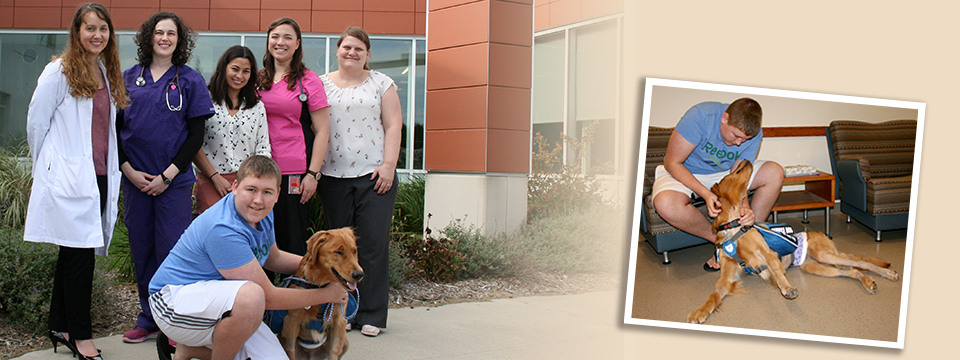
When Sparky was finally released after a month-long stay at the Hixson-Lied Small Animal Hospital in the College of Veterinary Medicine, an entourage awaited his departure.
There was hardly a dry eye in the house as Sparky bounded through the doors flanked by his owners and the various Iowa State veterinarians and veterinary students who treated him.
“Sparky is very, very important to our family,” said Gwen Damisch, one of Sparky’s owners. “He’s got a big fan club here.”
Sparky was admitted in early October at the Hixson-Lied Small Animal Hospital with tetanus symptoms. As his condition worsened he was placed on a ventilator. Soon he couldn’t walk and his chances for survival were 50/50 at best.
But the dedication of Sparky’s owners and veterinarians soon elevated that chance to excellent.
During his stay at Iowa State, Sparky received antibiotics, surgery to remove the toe that was suspected as the source of tetanus and anti-toxin injections. He was pumped full of IV fluids and given a stomach feeding tube. That care and some dedicated doctors and students pulled him through.
“His prognosis for survival is excellent and he should regain complete and normal mobility,” said Dr. Erin McQuinn, the attending veterinarian on Sparky’s case. “If everything goes the way we’d like, he’ll return to a completely normal dog.”
But Sparky isn’t just a normal dog. Sparky, a year-old golden retriever, is a service dog for Ron and Gwen Damisch’s teenage son Joey. Sparky assists Joey with his autism by helping him to perform in society, assisting him with life skills and giving him confidence.
It was important to the Damisch family that Sparky remain a part of Joey’s life and when he became sick they didn’t hesitate to come to Iowa State for treatment.
As his condition continued to worsen, the Damisches hopes also began to dwindle.
“We were prepared for the worst, but we soon realized that Sparky is a fighter,” Gwen said. “I know in his mind he needed to get better so he could go back and help Joey.
“He beat the odds and got better and better. I really think it’s a miracle.”
Sparky still has a long ways to go. He will meet with a physical therapist one or two times a week for the next few months to try to regain strength and flexibility in his legs. During his stay at the Hixson-Lied Small Animal Hospital, he lost some of the muscle by being bed-ridden for so many days, but McQuinn says he should be totally improved soon.
The outpouring of support for Sparky has been amazing. The Damisches, who live in Cedar Rapids, have received emotional and financial support from friends and neighbors as well as clients of Gwen’s grooming business. Joey’s school has held bake sales to help provide financial assistance.
“I truly believe that Sparky is able to come home because of a love of a boy, the great community support we’ve received and the excellent care of the doctors at Iowa State,” Gwen said.
As indicated by his emotional departure from his month-long home away from home, Sparky became a part of the Iowa State family as well.
“It was hard to everyone to see a dog who came in walking, wagging his tail and sweet as can be take this turn for the worst as his disease progressed,” McQuinn said. “We never want to see our patients get worse, but with Sparky it was especially hard because when we first diagnosed his tetanus he was still feeling OK.
“Our doctors and technicians spent hours by his side and our critical care team were with him around the clock, cleaning him, feeding him and assisting him with breathing through a ventilator. When he took his first steps there was a great celebration.
“It’s gratifying for our team to invest time, so much effort and so much of our hearts into a patient and have them get to leave the hospital wagging their tails, with a ball in their mouth and with their family.”
There were many other veterinarians and students on Sparky’s medical team. Students Adam Eby and Kathleen Kimball were extensively involved on the case. Veterinarians in addition to McQuinn were Dr. April Blong, critical care and nutrition specialist; Dr. Becca Walton, critical care specialist; Dr. Mike Curtis, emergency clinician; Dr. Julia Riha, emergency clinician; Dr. Melissa Gettinger, internal medicine resident; Dr. Thomas Riegel, surgical team; and Dr. Louisa Ho-Eckert, surgical team.
The ICU technicians included Lisa Foster, Courtney Olson, Liz Hick, Julianne Swenson, Mary Slykhuis and Jess Griffith.
October 2016
